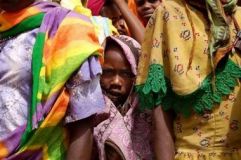Chadian civilians help Sudanese Janjaweed attack countrymen
June 22, 2006 (N’DJAMENA) — Growing numbers of Chadian civilians are joining raids on their black African countrymen by mounted Arab Janjaweed militia from Sudan’s neighbouring Darfur region as violence worsens in eastern Chad, survivors say.
 There is a long history of cross-border Janjaweed incursions along the Chad-Sudan border, but observers say in the last three months there has been a marked upsurge in the frequency and violence of attacks, and more involvement of Chadian civilians as an insurgency by Chadian rebels has intensified.
There is a long history of cross-border Janjaweed incursions along the Chad-Sudan border, but observers say in the last three months there has been a marked upsurge in the frequency and violence of attacks, and more involvement of Chadian civilians as an insurgency by Chadian rebels has intensified.
“When the Janjaweed come, there are also Chadians with them,” said Hassan Moussa, who helped bury the dead after a Janjaweed massacre in the village of Djawara in mid-April, in which 118 people died.
“The Janjaweed are from Sudan, they don’t know where the villages are, or who owns which cattle. So it’s the Chadians here — certain ethnic groups — who act as guides and accomplices for the Janjaweed,” he said.
Residents have deserted dozens of villages along the Chad-Sudan border and U.N. refugee agency UNHCR estimates 50,000 Chadians have been forced to flee their homes.
Survivors in Djawara said the Sudanese Janjaweed wore military fatigues, while the Chadians were in civilian clothing.
“Every man was armed,” said 40-year-old Abdulaye Yaya Abdulaye, one of the few survivors of Djawara.
“The Janjaweed carried Kalashnikovs and M14s. The Chadians also had arms, but carried machetes as well. After people were shot, if they were still alive, they were finished off with machetes,” Yaya said.
ARABS AND BLACK AFRICANS INVOLVED
Local people talk about their countrymen joining an “Arab alliance” although both Arab and some black African tribes from Chad have thrown their lot in with the Janjaweed.
They have attacked villages of other black tribes, mirroring the pattern of three years of Janjaweed raids in Sudan’s Darfur.
Apart from stealing cattle and other goods, attacks appear motivated by opposition to Chad President Idriss Deby.
Deby accuses Sudan’s President Omar Hassan al-Bashir of backing Chad’s eastern-based rebels, some of whom also appear to have joined in Janjaweed attacks. Al-Bashir denies helping them.
“Well before the attack, the Janjaweed visited us and asked us to join their alliance, to help overthrow President Deby,” said another survivor of the Djawara massacre, which coincided with an April 13 Chadian rebel attack on the capital N’Djamena.
“We said ‘No, we are just peasants, we cannot meddle in politics.’ So they said ‘OK, if you don’t want to join us, you will see what will happen.’ A few weeks later, they came back to kill us,” said the survivor, who did not want to be identified.
Humanitarian workers in the region say those kind of threats could have helped persuade some Chadian civilian groups to join the Janjaweed. Others may have been forced to take part, or lured by the promise of a share in the stolen cattle.
Seid Ibrahim Mustafa, Sultan of Dar Sila — a traditional hereditary title — accused Khartoum of exploiting ethnic differences in eastern Chad for political ends.
“It’s a political problem,” he said. “We’ve had different ethnic groups living together here for thousands of years. Why has this violence happened so suddenly?
“I think this Janjaweed problem is just a pretext. The Janjaweed have a relationship with the Chadian rebels. They are working for the Sudanese government; Sudan is trying to destabilise Chad,” he added.
(Reuters)
